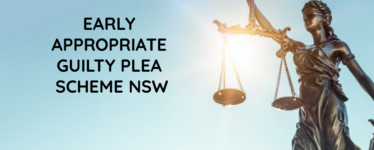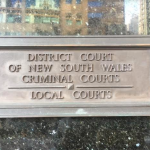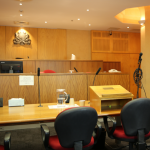What is the Early Appropriate Guilty Plea (EAGP) Scheme in New South Wales?

On 30 April 2018, a legislative scheme was introduced with statutory caps on discounts that can be given for the utilitarian benefit (the saving of court time and public resources) of a guilty plea in cases that proceed, or are to proceed, to a higher court such as the District or Supreme Court of New South Wales.
The scheme is known as Early Appropriate Guilty Pleas (or EAGP) and prescribes the following caps on sentencing discounts in cases where the defendant pleads guilty:
- 25% if the plea of guilty is entered in the Local Court; in other words, before it is referred to a higher court,
- 10% if the plea of guilty is entered in the higher court at least 14 days before the first scheduled trial date, or
- 5% if the guilty plea is entered thereafter.
Which criminal offences are captured by the EAGP scheme?
Criminal offences contained in New South Wales legislation – such as the Crimes Act 1900 (NSW)– fall into three broad categories:
- Summary offences, which are finalised in the Local Court,
- Indictable cases, which may be finalised in the Local Court or committed (referred) to a higher court such as the District Court, and
- Strictly indictable cases, which cannot be finalised in the Local Court and must be referred to a higher court.
The second category of offences is divided into two subcategories – Table 1 offences and Table 2 offences.
Table 1 offences are those where either the prosecution or defence can elect (choose) for a case to be referred to a higher court.
Table 2 offences are those where only the prosecution can make this election.
The EAGP scheme applies to strictly indictable offences as well as Table 1 and Table 2 offences where an election is made to refer the case to a higher court.
It also applies to Commonwealth criminal offences – such as those under the Criminal Code Act 1995 (Cth) that are referred to a higher court.
What are the steps in the EAGP process?
The stages of most EAGP matters are as follows:
-
Brief of prosecution evidence
When someone has been charged by the police, they will receive their court attendance notice and be given a first court date.
This first court date is called a ‘mention’, which is an administrative court date.
At the first mention for an EAGP matter, the Court will order that the prosecution brief of evidence is served on the defendant or their lawyer and on the Office of the Director of Public Prosecutions (ODPP).
The matter is adjourned for 8 weeks to allow the brief to be served.
-
Charge Certification
After the 8-week adjournment, the parties return to Court and provide an update on the status of the brief, if it has been served or if there are items missing.
The brief of evidence should contain all the evidence required for the prosecution to prove the charge/s. Depending on the complexity of the case, a further adjournment may be required.
Once the complete brief has been served, the court will make an order for charge certification. The matter is adjourned for 8 weeks to give the ODPP time to certify the charge/s.
Charge certification requires the ODPP to certify the charge/s by reviewing the material in the brief of evidence served and confirming that the charges are supported by the evidence.
The prosecution may find that the brief of evidence is not capable of proving the offence/s or may prove other offences.
The prosecution may decide to lay additional or alternative charges, withdraw charges, or proceed with the original charge/s.
A charge certificate confirming the charges that the ODPP has chosen to proceed with if the case goes to trial in the District Court or Supreme Court is prepared and provided to the defendant and will be filed in the Local Court at the next mention date.
-
Case conference
Once the prosecution has filed the charge certificate, the Court will order that the parties participate in a criminal case conference.
The matter is adjourned for 8 weeks to give the parties time to hold the case conference.
This is a meeting where the defence and the ODPP discuss the case, the evidence in the brief, and any legal issues identified and there may be discussions about an appropriate plea. There may be more than one case conference required.
At the end of the case conference process, a case conference certificate will be prepared and provided to the defendant and will be filed at the next mention date. The case conference certificate will include information such has any pleas or offers made, rejected or accepted.
-
Committal
Once the case conference certificate is filed (it is provided to the Court in a sealed envelope) to protect the confidential information contained on the certificate.
The Court is then provided with an update on whether an appropriate guilty plea was agreed or not agreed and if the matter will proceed to sentence or trial in the District Court.
Pleas of guilty or not guilty will be entered for the offence/s listed on the charge certificate.
If pleas of guilty are entered, then agreed facts will also be provided to the Court.
The matter will then be committed to the District Court or Supreme Court for sentence.
If pleas of not guilty are entered, then the matter will be committed to the District Court or Supreme Court for a trial; which is where witnesses are brought to court and questioned, and the ‘fact-finder’ (whether the jury or a judge-alone) will determine whether the prosecution has proven its case beyond a reasonable doubt.
Going to court for a serious criminal case?
If you’ve been charged with a serious criminal offence, call Sydney Criminal Lawyers anytime on (02) 9261 8881 to arrange a free first conference with an experienced, specialist criminal defence lawyer who will advise you about the law and EAGP process, your options and the best way forward, and formulate and implement defence strategies to ensure you have the highest likelihood of achieving the optimal result.






